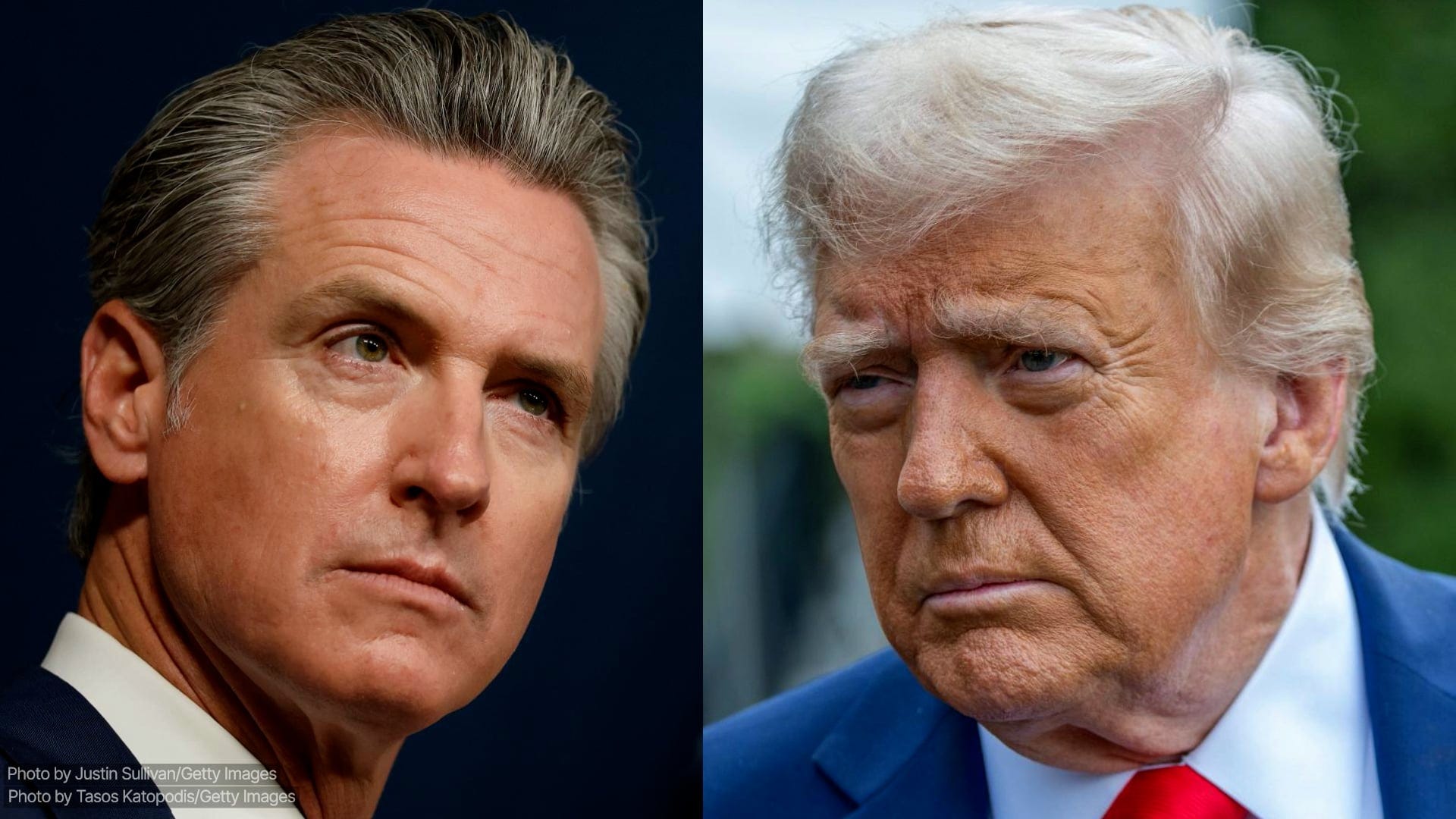A number of Americans who started life in countries run by an authoritarian leader see lots of warning signs in Trump’s behavior.

Gavin Newsom fears there will be no 2028 presidential election
Gov. Gavin Newsom warned that the US may not see a presidential election in 2028, describing authoritarian actions by the Trump administration.
unbranded – Newsworthy
As a child in Cuba, Mike Fernandez watched as his teachers were replaced with government instructors, books vanished from classroom shelves and ultimately, Communist Party officials took over his dad’s tiny sandwich stand.
Now the self-made billionaire and longtime Republican campaign donor watches uncomfortably from South Florida as President Donald Trump takes many of the same steps he saw under Fidel Castro.
Like many people who fled to the United States from authoritarian regimes, Fernandez says the United States appears to be at a tipping point, with Trump centralizing power to silence dissent and punish people he’s declared as enemies, while bullying private businesses to fall in line.
“There’s something wrong, and we all know it,” Fernandez told USA TODAY. “Many people are hoping it’s going to go away on its own, and it’s not going to go away on its own.”
The billionaire émigré added: “I’m scared of how fast we’re moving.”
Trump argues that the 2024 election he won represents a mandate from American voters who endorsed his muscular leadership approach. Trump has justified his actions as necessary to secure the United States from both an “invasion” of immigrants and what he describes as the unwillingness of Democratic officials to stamp out visible homelessness, halt certain types of crimes and prevent civil disorder.
A historical analysis by Gallup shows Trump’s approval ratings in August of his first years in office − both as the 45th and 47th presidents − are lower than any other modern president at the same time in their administrations. In Gallup’s pollingroughly 40% currently approve of Trump’s job performance.
Despite the unfavorable polling, Trump has repeatedly suggested that he would serve a third term as president ‒ although the Constitution prevents him from being elected again ‒ and openly mused about how other countries have cancelled elections during war or other national emergencies.
Warning signs of authoritarianism
People who have fled authoritarian regimes say it’s a combination of actions that are cause for concern right now in the United States, especially after Trump declared at activist Charlie Kirk’s funeral that he “hates” his opponents. Those interviewed by USA TODAY raised a host of parallels they see between the authoritarian leadership of their native countries and Trump’s actions over the last eight months:
- Routine use of military forces to disperse anti-government protests, especially over the objection of local officials, as happened in California and Washington, DC.
- Declarations that certain rights, especially for certain groups, must be curtailed because of a national emergency, such as ending due process hearings for accused undocumented immigrants.
- Singling out of minority groups for harsh and selective prosecutions, often based on old laws. The White House has argued its immigration crackdown largely reflects a return to enforcing existing law that successive past presidents ignored.
- Reduced access to legal counsel, especially for those targeted minority groups.
- Nationalization of businesses deemed critical to the government’s success. Trump announced on Aug. 22 that the federal government would purchase a 10% stake in struggling chipmaker Inteland has expressed interest in buying into other companies as well.
- Frequent reminders of the government’s power and role in dominating public life, in part with monuments and banners dedicated to the leader. Earlier this year, three federal buildings in DC were festooned with giant images of the president.
- Lack of free and fair elections, with leaders manipulating the system to remain in power. Trump has pressured several Republican-led states, including Texasto redistrict to make it easier for Republicans to win seats in Congress. He has also spoken against popular mail-in ballotssaying without evidence that they are ripe for fraud.
- Using government power to punish or silence opponents and journalists, and declaring them enemiesas Trump has most recently done with late-night host, Jimmy Kimmel.
The Trump administration has argued that each one of these actions is necessary and consistent with its Make America Great Again agenda, and that the Biden administration was guilty of many seemingly authoritarian measures, too.
Tanks as common as ice cream trucks
For Eddie Flores, growing up in El Salvador meant seeing military tanks rolling through neighborhoods as often as ice cream trucks. Flores’ family fled the country’s devastating civil war when he was 7.
Last year, he became the first Salvadoran-born immigrant elected mayor of South San Francisco.
Now, along with balancing the city’s biotech cluster and creeping gentrification, he’s also helping coordinate neighborhood groups opposed to Trump’s mass immigration sweeps. More than a third of the city’s residents are Hispanic, and despite concerns ahead of the city’s popular Cultura Fest in August, no disruptions occurred.
In the Los Angeles area, Trump’s ICE agents have swept up thousands of undocumented immigrants, sometimes chasing them through the streets or farm fields. Protests against the ICE raids became violent, and Trump then deployed active-duty Marines and members of the California National Guard onto city streets over the objection of local officials.
Trump has also deployed the National Guard to Washington, DC, and has threatened to unleash his newly renamed “Department of War” into Chicago.
“I constantly tell my staff that we have to remain proactive and have systems in place before any harm arrives,” Flores said. “It’s about consistently showing up for your neighbors, not just when they are in need, so they don’t have to live in the shadows.”
He added: “Authoritarianism has no place in a country built on pluralism, and we as leaders have to safeguard that promise.”
Recognizing patterns of behavior
For a 41-year-old immigrant from the Middle East, the United States had long been a bastion of freedoms ‒ a place where the right to criticize the government is written into the nation’s founding documents. Several members of his family have been detained in his home country for years for speaking out against their leaders.
“We came here to express ourselves and have found ourselves in this dilemma that we’d never thought we’d face,” said the man, who USA TODAY agreed not to identify.
The man, a legal researcher who lives legally in the United States, is worried he might be targeted by the federal government for speaking freely. “It’s very, very ironic that we now suggest to folks who are visiting us from outside the United States to delete apps, delete text conversations, delete images even though they are completely innocent.”
The man, who is also a human rights expert for a nonprofit, said he’s watched in fear as Trump has attacked the rule of law, singled out minority groups for harsh prosecution and declared emergencies or accused people of terrorism to justify some of his actions. He said Americans should heed the warnings of refugees like him who have lived under oppressive regimes and can recognize the patterns playing out.
It’s easy for people in society’s mainstream to think what’s happening to minority groups will never happen to them, he said, adding that he has been disappointed more Americans haven’t been trying to halt Trump, given the country’s founding system of checks-and-balances brought by the courts, Congress and a free press.
“It’s going to reach you at some point, and when it does, there’ll be nobody there for you because you were never there for them,” he said.
Echoing childhood memories
Like many other people who sought safety in the United States, Davis, California, resident Griselda Gonzalez said watching federal troops patrolling Los Angeles conjured up painful childhood memories.
The Salvadoran native can vividly recall when she was 10, as guerrilla fighters stormed her hometown of San Salvador, the nation’s capital. The complex and brutal civil war in her country killed thousands. Visions of explosions and constant gunfire, even in the smallest neighborhoods, sometimes pop into her head.
Today, she’s a married mother of three with a successful family-owned commercial moving company. But she said she’s shocked by how much the United States now resembles the country she fled: constant threats of military deployments, along with ICE raids targeting people who look like her.
“Five years ago, we were all fighting for our lives with COVID-19,” said Gonzalez, who became a naturalized citizen in 2014. “Now we’re worried about fighting for our basic rights?”
Done staying quiet
Fernandez, the Cuban refugee and American-made billionaire, became a U.S. citizen after serving as an Army paratrooper. He said he’s long been content to influence U.S. politics by funding political candidates, most of them Republicans.
But after watching how Trump and the people around him are behaving ‒ including Secretary of State Marco Rubio, whom he once strongly supported ‒ Fernandez said he’s done staying quiet.
He has begun funding a pro-immigrant campaign, bought anti-Trump advertisements in newspapers and is preparing to spend his fortune fighting what he sees as creeping authoritarianism and tyranny within the United States.
“If I go back to zero, I will do so because I came here with nothing and I owe this country to reinvest to defend it from within,” Fernandez said. “I think I owe it to the country. I owe it to my children and grandchildren to come back to a place where due process matters.”
The American people have more power than they think, said Fernandez.
“The more we speak as a group, the less likely we are to be targeted. I see myself being targeted already. Will I stop? No,” he said, encouraging everyone to speak out against what he sees as the president’s anti-Americanism.
“America used to be a great country,” he added. “It isn’t anymore, in the way it’s been designed by the current administration.”
Trevor Hughes and Terry Collins are National Correspondents at USA TODAY.













































